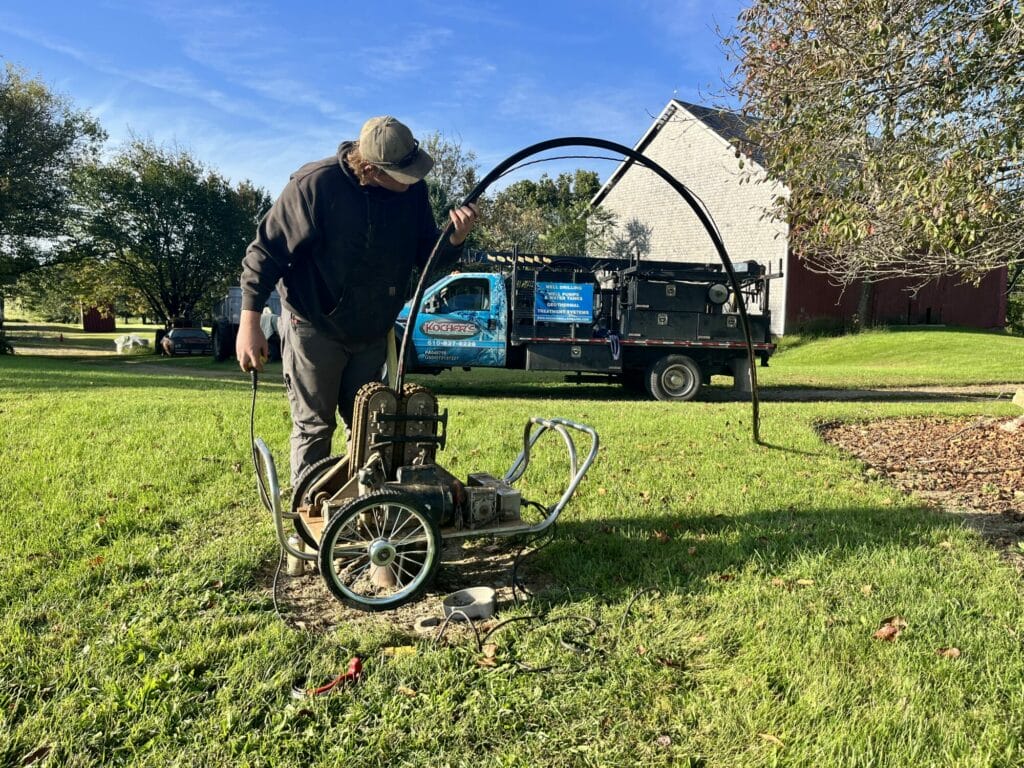Have you ever turned on a faucet and wondered where the water flowing out originates? For many, the answer lies deep beneath the earth’s surface, accessed through the age-old method of well digging. This article embarks on a journey to explore well water, a natural resource that offers a unique alternative to city-supplied water. With an increasing number of homeowners looking towards self-sufficiency and natural resources, understanding the essence of well water becomes not just an exploration but a necessity.
Key Insights:
- Natural Filtration Process: Discover how rainwater transforms into your glass of water through the earth’s natural filtration.
- Homeowner’s Responsibility: Learn the importance of being the first line of defense in ensuring the safety and quality of your well water.
- Cost versus Quality: Delve into the economic benefits and the rich, untampered taste that well water provides, juxtaposed with the responsibility it entails.
- Navigating the Risks: Uncover the potential risks associated with well water and the essential measures to mitigate them.
Diving into the world of well water reveals a unique blend of nature’s simplicity and the responsibilities of modern homeownership. This article illuminates the journey of well water from its underground sources to our homes, contrasting it with city-supplied water to highlight the benefits and responsibilities that come with owning a private well.
What is Well Water?
Well water is a type of water supply that is accessed by drilling a hole in the ground deep enough to reach an aquifer, a natural underground reservoir. Unlike city water which is treated and supplied by municipal systems, well water comes directly from the ground, making it a private water source for homeowners. The quality and safety of well water can vary depending on several factors including the location of the well, the depth of the groundwater, and the geological characteristics of the area.
The Journey of Well Water
- Natural Filtration: As rainwater seeps through the soil and rock layers, it undergoes a natural filtration process before becoming part of an aquifer.
- Extraction: Homeowners access this water through wells drilled into these aquifers. A pump system then brings the water to the surface for use in the home.
- Responsibility for Quality: Since well water bypasses municipal treatment, homeowners are responsible for ensuring the water’s safety through regular testing and treatment.
City Water
City water, or municipal water, is supplied to homes by the local government. It is sourced from surface water or groundwater and then treated at a water treatment facility to meet federal and state drinking water standards. This water travels through a vast network of pipes to reach individual homes.
Pros and Cons of City Water
Pros:
- Regulated Quality: City water is subject to strict federal and state standards, ensuring that the water is safe for consumption. This rigorous testing and treatment process aims to remove contaminants and pathogens, providing a consistent quality of water to all homes connected to the system.
- Convenience: With city water, homeowners enjoy the convenience of a constant water supply without the need for personal maintenance. There’s no need to worry about the operational aspects of a water well or the complexities of treating the water independently.
- Reliability: Municipal water systems are designed for high reliability, with an infrastructure that supports an uninterrupted water supply, even during times of drought or other environmental stressors.
Cons:
- Lack of Control: Homeowners have little to no control over the quality and treatment of city water. This can be a concern for those who prefer or require specific water quality standards, especially if sensitive to certain chemicals commonly used in municipal water treatment.
- Cost: While the initial setup for city water may not require a large investment from the homeowner, the ongoing utility bills can accumulate over time, representing a significant long-term cost.
- Potential for Contamination: Despite rigorous treatment processes, city water systems can still be susceptible to contamination through breaches in the infrastructure or due to environmental pollutants entering the water source. Such incidents, though rare, can affect large communities and require immediate and extensive remedial measures.
The Benefits and Considerations of Private Well Water
Owning a private well positions homeowners at the forefront of managing their water supply, offering distinct advantages alongside responsibilities that merit careful consideration.
Benefits of a Private Well:
- Cost Efficiency: After the initial installation, the cost of drawing water from a well essentially falls to zero, making it a cost-effective alternative to the ongoing bills associated with city water usage.
- Purity and Taste: Private well water is often lauded for its superior taste and natural mineral content. Free from the chemicals commonly used in municipal water treatment, well water provides a fresh, clean taste right from the tap.
- Control Over Water Supply: Using well water means having complete control over your water source. Homeowners can manage their water quality, addressing specific concerns with targeted treatment solutions.
Considerations for Well Owners:
- Maintenance and Testing: Ensuring water is safe requires regular testing and maintenance of the well system. Homeowners must be vigilant in monitoring their water quality to prevent any health risks.
- Risk of Contamination: Despite its natural filtration process, private well water can be vulnerable to contamination from environmental pollutants, such as surface runoff and pesticides. It’s crucial for well owners to implement protective measures and conduct regular water quality tests.
- Dependency on Electrical Power: Well systems rely on electric pumps to draw water. In case of power outages, homeowners may need alternative solutions to maintain their water supply.
Water Filter and Water Softener Solutions
For well water users, integrating a water filtration system and water softener is crucial for ensuring water quality and safety.
Water Filtration Systems
- Whole House Water Filters: These systems treat all the water entering a home, addressing contaminants like sediment, iron, and certain chemicals.
- Point-of-Use Filters: Installed at individual faucets, these filters provide an additional layer of purification for drinking water.
Water Softeners
Hard water, common in well water systems, can damage appliances and plumbing. Water softeners remove minerals like calcium and magnesium, preventing scale buildup and extending the lifespan of home appliances.
Testing Your Water: A Must for Well Owners
Regular water testing is essential for well owners to identify and address potential contaminants.
Water Testing Recommendations for Well Owners
- Annually: Conduct comprehensive testing for basic water quality indicators such as pH, total dissolved solids, and specific contaminants relevant to the area. This annual check-up helps ensure that the water remains safe for all household uses, from drinking to bathing.
- After Repairs or Changes: Any work on the well or significant changes in water taste, odor, or appearance necessitates immediate testing. This proactive approach can catch contamination or system issues early, preventing more significant problems down the line.
- Following Heavy Rainfall or Flooding: Increased runoff can introduce contaminants into your well water. Testing after such events ensures that your water has not been compromised by surface pollutants.
- If There’s a Change in Water Usage or Demand: Significant changes in your household’s water usage, such as the addition of new family members or the installation of a new plumbing system, might alter the dynamics of your well water system. Test to confirm that your water supply continues to meet your needs safely.
- When Introducing Water Treatment Solutions: After installing or modifying water softeners, filters, or any system treating the water, test both the raw and treated water. This ensures the effectiveness of your treatment solutions and that the water is less likely to cause harm or damage to your plumbing system.
- To Monitor Aging Infrastructure: As well systems age, components may deteriorate, leading to potential contamination entry points. Periodic testing can identify issues related to aging infrastructure before they impact water quality.
- Environmental Changes: Be alert to changes in your surroundings that could affect your well, such as nearby construction, new agricultural activities, or industrial operations. These factors might introduce new contaminants to the groundwater.
Weighing the Pros and Cons of Informed Decisions
In the quest for a sustainable and quality water supply, the decision between harnessing the natural bounty of well water and relying on the convenience of city water is more than just a choice—it’s a lifestyle statement.
This article has navigated the depths of well water’s journey, from its source to your tap, offering insights into the self-sufficiency it brings to homeowners. As we conclude our exploration, here’s a reflection on the essential insights shared:
- Natural Versus Treated: Understanding the untouched purity of well water compared to the chemically treated city supply.
- Economic and Environmental Considerations: The long-term savings on your monthly water bill with a private well versus the ongoing costs associated with city water.
- Homeowner Autonomy: The control and responsibility you have over your home water system when relying on private well water.
- Quality Assurance: The importance of regular testing and maintenance to ensure your water is safe, highlighting the direct impact on your home’s plumbing system and overall well-being.
Owning a private well offers an unparalleled sense of independence and connection to the environment, granting homeowners not just water but a reservoir of self-reliance.
Yet, it comes with the duty to maintain and safeguard this natural resource, ensuring every drop from the well enhances rather than compromises your home’s sanctity.
Whether it’s the allure of potentially lower monthly water expenses, the preference for water’s natural taste, or considerations for your plumbing system’s longevity, the choice embodies a commitment to both the quality of your home water and the health of those who drink from it.
As you ponder the future of your water supply, remember, that the essence of well water speaks to the heart of sustainable living, echoing a choice that resonates with those who value autonomy, quality, and the environment. Embrace the journey of making an informed decision, ensuring that every glass of water you drink not only quenches your thirst but also reflects your values and lifestyle.




